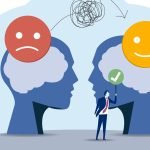Disclaimer: The post is developed in partnership with BetterHelp
It’s only natural for someone to enjoy shopping and acquiring new things, such as fashionable clothing, makeup, technology, home goods, books, hobby items, and sports gear. For many of us, shopping is an enjoyable pastime and a fun way to spend an afternoon with friends and family. For others, the dopamine release associated with the excitement of shopping can bring a much-needed sense of relief that can become a coping mechanism.
But when does this entertaining pastime potentially cross over into compulsive spending habits that are interfering with your life? Please consult a professional if you’re struggling or believe you’re unable to manage your spending habits and take the time to educate yourself more on ways to improve your situation. One resource to check out is BetterHelp’s advice on identifying compulsive spending habits: https://www.betterhelp.com/advice/therapy/can-a-shopping-therapist-help-with-your-compulsive-spending-habits/
In this article, we’ll look at some of the ways to better understand how a shopping addiction can work, the negative effects of a shopping addiction, and finally, ways to help overcome a shopping addiction.
What Is Compulsive Buying Behavior?
In slang terms “retail therapy” refers to the boost one can experience from purchasing while shopping. But for those living with shopping addiction, a seemingly innocent trip to the mall can lead to serious negative consequences when their spending becomes out of control.
Compulsive buying behavior (CBB), or shopping addiction as it is sometimes referred to, occurs when a person uses shopping as a method to regulate their mood. Say a person has experienced an upset, as can happen to anyone, and they want to feel better. The person who is experiencing compulsive buying behavior uses shopping to get a kind of high, which helps them to feel better temporarily. Yet the behavior can come with negative financial consequences if the person is purchasing items they cannot afford.
Patterns Associated With Compulsive Buying Behavior
Often the pattern of compulsive buying behavior is accompanied by negative feelings of shame and guilt after making a purchase the person knows they cannot afford. Yet the person may not be able to stop themselves from compulsively buying things they can’t afford — despite the financial issues and other problems being caused by their purchases.
It’s important to take into account that the financial effects of compulsive buying behavior can be long-lasting, certainly longer than the temporary positive flood of feelings from dopamine. Compulsive buying can have effects on a person’s credit score or result in debts that are difficult to manage later on. The effects it can have on a person’s relationships can be even more lasting. Often the person engaging in compulsive shopping is lying to their spouse or loved ones about the amounts they’re spending because they feel out of control in their buying habits.
This is in contrast to a shopper whose primary concern is to solve a problem of some sort. When someone sets out to fix something or solve a practical concern, it often doesn’t involve them gaining a positive mood boost from the transaction.
While consensus has not been reached by the American Psychiatric Association on the nature of compulsive buying behavior, therapists recognize there are documented symptoms and signs.
What The Research Says About Compulsive Buying Behavior
According to research focused on consumers experiencing compulsive buying behavior published in Frontiers In Psychology, there are identifiable ways people often use compulsive buying behavior to achieve improvements in mood and self-esteem. People experiencing CBB often make shopping purchases to help cope with stress improve their mood, enhance their self-image, and assist in gaining social recognition and approval from others.
People can turn to compulsive spending for any number of reasons, but the source of stress will still be present after the positive flood of feelings fades. In addition, several new problems can be caused by compulsive spending habits that make the person even more stressed. Unfortunately, the additional stress can lead to even more compulsive shopping.
Steps To Take When Experiencing Compulsive Buying Behavior
When compulsive shopping is causing negative outcomes that are making life more difficult, it may be time to consider speaking with a therapist.
If you feel like compulsive spending habits may be causing negative consequences in your life or for someone you know, then it may be a good time to consider speaking with a therapist. Just remember, you’re not alone. There’s help out there.





